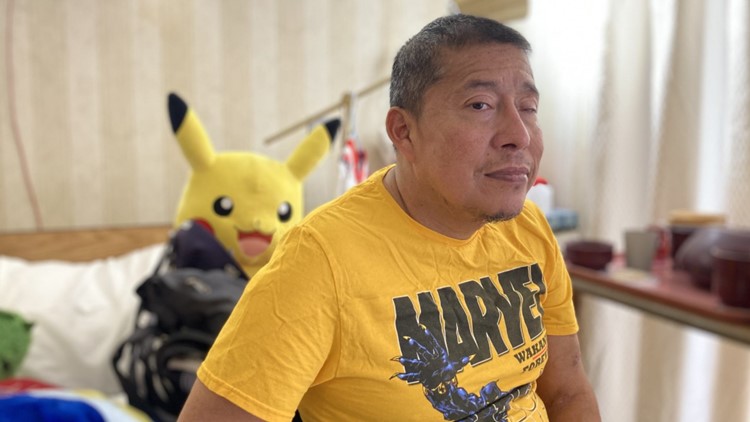SAN DIEGO — A large stuffed Pikachu peaked out of a duffle bag on Victor Valero’s hospital bed.
“That’s my dialysis buddy,” he said. “Keeps me company.”
Valero’s kidneys failed in 2018 — a consequence of diabetes, he said. He spends three mornings a week tethered to a machine that cleans his blood. His diabetes also caused him to lose sight in his left eye, and he needed heart surgery last year.
As his health declined, Valero, 47, said he had trouble holding down a job. He became homeless and bounced between hotels. In July 2021, Valero moved into the Park Anaheim Healthcare Center, a nursing facility that has given him stability, placing him closer to his kids and the dialysis center he depends on.
Then in October 2021, Valero found out he would have to pay for the health care benefits he received through Medi-Cal, the state-run health insurance program. The price: Nearly everything he earned each month.
“I was angry. I was helpless,” he said.
Medi-Cal members who end up in long-term care for 30 days or more can be required to pay for a portion of the care they receive. This “share of cost” can mean losing their entire paycheck except for a monthly “personal needs allowance” of $35. Those who end up in long-term care, perhaps after a devastating illness or injury, may still have other financial obligations, however, such as a car payment or storage fees, so advocates have long argued that the $35 per month they’re left with is unacceptable.
“The only word I can think of is piddly,” said Alicia Emanuel, an attorney with the National Health Law Program, which advocates on federal and state health care issues. “There is a real impact to people who are low income.”
To read the full story from inewsource, click here.
inewsource is a nonprofit, independently funded newsroom that produces impactful investigative and accountability journalism in San Diego County. Learn more at inewsource.org.
Watch: Governor Gavin Newsom proposes universal health care coverage in California (Jan 10, 2022)



